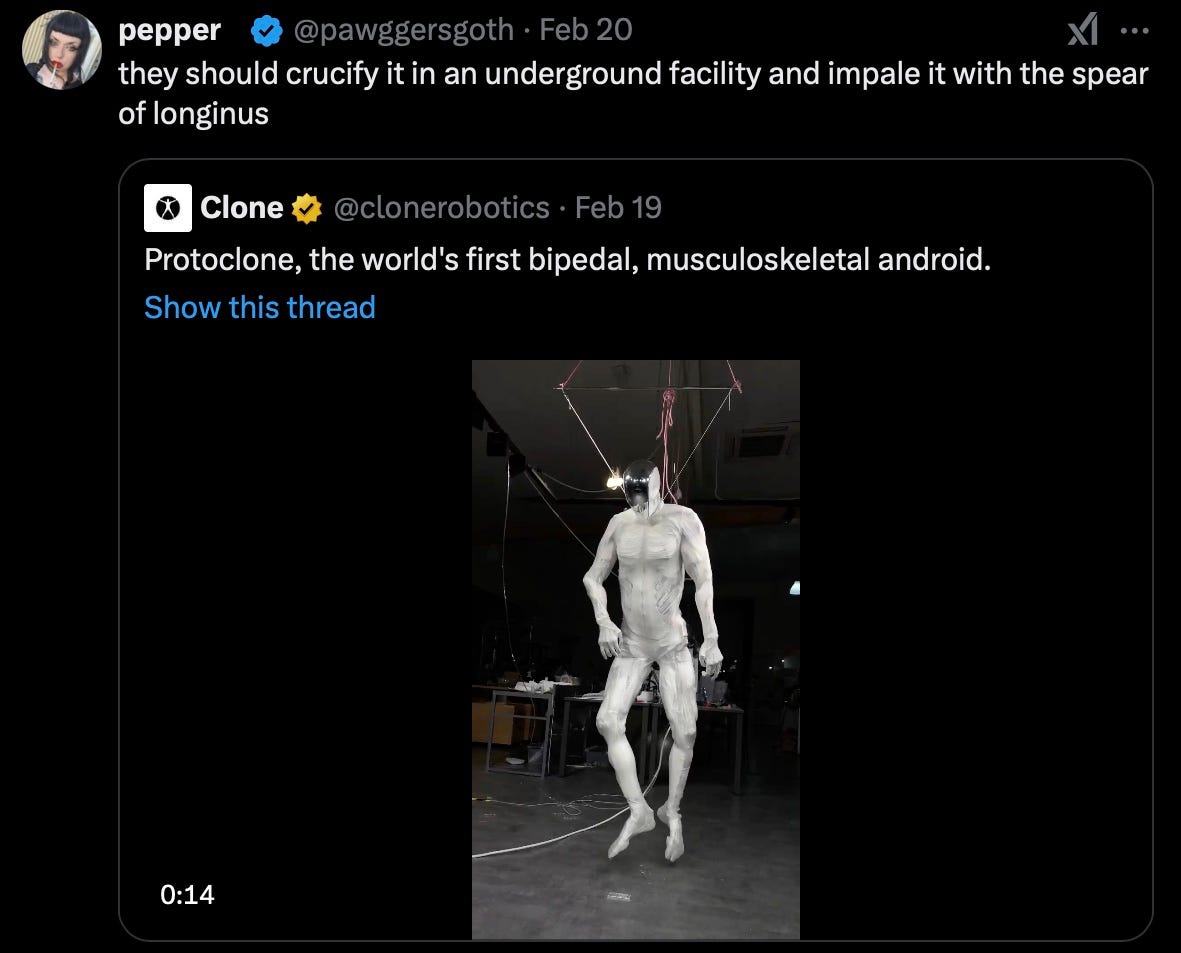I’m back with a review covering two of my favorite topics: movies and AI! While humans have been making films and TV shows featuring robots and advanced AI for almost 100 years (!), the concept is increasingly becoming closer to reality. This week on X, a creepy Evangelion-inspired bipedal android freaked people out, while also bringing some minor delight to those of us who’ve watched the classic anime.
For us millennials, our most enduring memory of the rise of machines is, of course, the Terminator and The Matrix films. Who can forget, “Come with me if you want to live”? But it was Fritz Lang’s Metropolis (1927) that first introduced the idea of a humanoid robot gaining consciousness, setting the stage for AI representation in cinema. Way back in 1818, Mary Shelley pioneered the concept of created beings developing consciousness and emotions in Frankenstein.
And, of course, we can’t forget Isaac Asimov, one of the first to explore the ethical and philosophical implications of sentient AI in his 1950 collection of science fiction short stories, I, Robot, which later inspired the film adaptation of the same name. Asimov’s Three Laws of Robotics, which focus on a robot's duty to protect humans, obey orders, and preserve its own existence as long as it doesn’t harm humanity, remain influential today. These laws are referenced in many works featuring robotics and AI, including Ex Machina (2015), Westworld (2016–2022), A.I. Artificial Intelligence (2001), and RoboCop (1987), among others.
Review: Companion
The wonderful Sophie Thatcher (Yellowjackets, Heretic) and Jack Quaid (The Boys) star as Iris and Josh, a couple on a weekend getaway with friends at a remote cabin, which unravels into chaos after a murder is committed. Iris is revealed to be a robot, but she has no concept that she is one. Before the revelation, she assumed she was just a regular woman who met her boyfriend at the supermarket and fell in love with him. But this is all part of her programming as a companion robot. She’s tricked into committing a crime after Josh performs an illegal modification on her programming. The film follows her as she tries to escape Josh and his friends in the woods, ultimately wresting control of herself from Josh, seeking revenge, and fighting for her freedom.
This film made me want to rewatch Humans (2015–2018), a British adaptation of a Swedish tv series starring Gemma Chan (Eternals, Crazy Rich Asians), which explores robots achieving sentience due to programming. You can watch the whole series for free on Tubi. The first season is quite good, and with only eight episodes per season, it’s very bingeable. I’ve personally been staying up way too late this week watching it.
Robot Rights and AI’s Ethical Dilemmas
Although Humans first came out in 2015, it feels more relevant than ever as we now interact with AI on a daily basis. The tech lords in Silicon Valley are trying to bring to life the kind of autonomous, agentic AI technology we’ve seen in movies and TV shows, and as these productions have explored, that technology comes with many ethical questions. Can robots consent? Do they deserve rights? Can they have rights if they can think and feel independently of their programming? Is their “life” worth the same as a human’s? What are the economic and social implications of a robot workforce taking over human jobs? If we don’t grant sentient robots rights, are we effectively enslaving them? Should we create human-only spaces devoid of AI presence?
Humans even delves into complex topics like robots “procreating” through programming and functioning as parents to child robots. The show also examines how growing up around this technology impacts children psychologically. In season two, there’s a storyline about a young girl (Letitia Wright) who impersonates a robot as a way to cope with loneliness and emotional distance from her parents.
In the third season, the show explores robot civil rights, drawing clear parallels to America's civil rights movement and the fight for integration. It introduces two opposing robot factions with different approaches to gaining rights: one advocating for armed resistance, while the other focuses on changing hearts and minds through policy and peaceful protest.
Human-AI Relationships
Despite the growing number of films and TV shows exploring human-AI connections, depictions of gay pairings remain rare. A few exceptions include Humans (which features an ongoing lesbian human-robot relationship in seasons two and three), Black Mirror’s iconic “San Junipero” episode, Westworld, and Battlestar Galactica.
In Companion, Harvey Guillén (What We Do in the Shadows) and Lukas Gage (Smile 2, The White Lotus) deliver standout supporting performances as a gay couple in a human-robot relationship. I especially enjoyed Gage’s portrayal of a murder-bot, which felt inspired by Robert Patrick’s iconic performance as the T-1000 in Terminator 2 (1991).
One might wonder if the robots in these fictional scenarios are aware of gender. Are they programmed to perform in stereotypically cisgender ways to match their male and female presentations? In Companion, Iris is styled and dressed to resemble a prototypical young woman from the 1950s. Her programming paired with her nostalgic and stereotypical female presentation is a nice visual nod to the current tradwife aesthetic and return to tradition movement that’s trending in far-right spaces on social media.
The film also explores the implications of male-female human sexual relationships in a world where men can live out any fantasy with a robot. This is highlighted in a monologue from Josh, an aggrieved incel who believes he’s not getting what he “deserves.” Unable to attract real human partners, likely due to his toxic personality, he instead rents a companion robot to fulfill his desires.
Each season of Humans features an enraged female robot who has been abused in some way, fueling her deep resentment toward humans. The show, like many others, illuminates the reality that men will inevitably misuse female robots—in Companion a minor character mentions that female pleasure bots have been used for target practice, and Josh captures and tortures Iris at one point. IRL it’s been reported that young men are signing up for AI chatbots to be their girlfriends and verbally abusing them.
While Companion doesn’t dive too deeply into complex human-AI ethical dilemmas like Humans, it remains highly entertaining and well-acted. By the time the credits rolled, I was already imagining a crossover between Iris and M3GAN (2022), two robot girls teaming up to take on the world.
Stream it or Skip it
Keeping the horror movie vibes going, here are some films I’ve watched recently. After this post, you might never want to visit a cabin again, or ever.
Speak No Evil (2024) – Stream it; currently on Peacock
A family on holiday (MacKenzie Davis, Scoot McNairy) with their young daughter befriends another family (James McAvoy, Aisling Franciosi) and their young son. When they accept an invitation to visit their new friends' country home, things quickly take a dark turn. This film is unsettling, but the original 2022 Danish film it’s based on is even more disturbing. James McAvoy, who is becoming a bit of a scream king, was excellent in Split (2016), ramps up the creep factor wonderfully here. I especially appreciate how the film explores masculinity and marital roles in a tense, psychological horror setting.
Longlegs (2024) – Skip it; currently on Hulu
A detective, who may or may not have psychic abilities, is hunting a child killer. There was a lot of hype around this film, thanks in part to its heavily discussed marketing campaign. But honestly, you’re better off rewatching David Fincher’s Seven (1995) or Zodiac (2007), or the film this one is trying hardest to emulate, The Silence of the Lambs (1991). The first half is engaging solely due to its visual style, while the second half falls apart due to a nonsensical storyline, and like many modern horror films, it leans too hard into the aesthetics of the villain while lacking narrative coherence. There’s something about Satan and religion in the mix, maybe a nod to Rosemary’s Baby (1968), but in the end, the plot doesn’t add up to much.
Humanist Vampire Seeking Consenting Suicidal Person (2023) – Stream it; currently on Shudder & MUBI
This teen vampire love story is, dare I say, kind of adorable! Sasha, a young vampire, struggles to feed on humans due to her overwhelming empathy for them, but when she befriends a boy with suicidal tendencies, her world changes. It’s not overly gory and has some genuinely funny moments. A charming and fresh take on the vampire genre.
Cuckoo (2024) – Skip it; currently on Hulu
This film explores mother-daughter relationships through the lens of a grieving teenager trapped in the Bavarian Alps, where she encounters a series of supernatural entities called cuckoos. Like many recent horror films, it’s visually stunning—each scene looks like a vintage postcard shot on Fujifilm—but the villain feels both overly costumed and underdeveloped. This is one of those movies that might have been stronger in the hands of a female writer/director. Spoiler: The concept, which involves a female creature impregnating human women who then go on to impregnate other women, had the potential for a rich and unsettling exploration of bodily autonomy and more intriguing body horror, but the film doesn't fully capitalize on it.
Have you watched anything good lately? Did you also watch Companion and have thoughts? Reply back to this email or leave a comment with your recommendations.
Until next time!
Read more:





